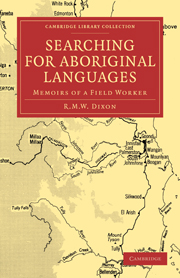Book contents
- Frontmatter
- Contents
- List of Illustrations
- Acknowledgments
- Map
- 1 Setting Off
- 2 “Haven't you got a machine?”
- 3 “You never talk it to me!”
- 4 Full of Unforgettable Characters
- 5 “Time to get back to wife”
- 6 “Drink this!”
- 7 “Of course we'll keep in touch”
- 8 “Doing all these Jalnguy”
- 9 Lots of Linguistic Expertise
- 10 “This way be bit more better”
- 11 “Happiness and fun”
- 12 “It's not”
- 13 “Those are good for you”
- 14 Loss
- 15 “I think I like that language best”
- Afterword
- Pronunciation of Aboriginal Words
- Tribal and Language Names
7 - “Of course we'll keep in touch”
Published online by Cambridge University Press: 05 December 2011
- Frontmatter
- Contents
- List of Illustrations
- Acknowledgments
- Map
- 1 Setting Off
- 2 “Haven't you got a machine?”
- 3 “You never talk it to me!”
- 4 Full of Unforgettable Characters
- 5 “Time to get back to wife”
- 6 “Drink this!”
- 7 “Of course we'll keep in touch”
- 8 “Doing all these Jalnguy”
- 9 Lots of Linguistic Expertise
- 10 “This way be bit more better”
- 11 “Happiness and fun”
- 12 “It's not”
- 13 “Those are good for you”
- 14 Loss
- 15 “I think I like that language best”
- Afterword
- Pronunciation of Aboriginal Words
- Tribal and Language Names
Summary
We played Chloe a bit of the Mbabaram tape and she wondered at it. She'd never heard any of those words before. Fancy that! That old man up there still knowing a bit of Mbabaram, poor old thing. At least he'd been able to help me out when that cranky old Lizzie Simmons wouldn't. Wait till Chloe saw her, she'd give her a piece of her mind.
Chloe was more interested in the half-dozen Mamu texts I'd recorded from George Watson.
“He really knows that language. And what he tell you there – that's right. He got it right all through, that old man.”
It gradually came out that Chloe and George, both half-castes, had been at one time destined to marry each other, according to the Aboriginal system of “promising”. Chloe said she hadn't really fancied the idea, and she took good care to keep out of George's way. (It seemed that George had had a fairly lively life. About half the old ladies I met became unnaturally coy when his name was mentioned, and admitted that they'd been “girlfriends” of George Watson many years before.)
The four genders of Dyirbal were attracting my interest. At first it seemed that they were “masculine”, “feminine”, “edible” and “neuter”. “Edible” was clear enough – all fruit and vegetables took the gender marker balam. There was balam gubungara, a palm tree, whose “heart” was eaten, and balam bangginyu, a tree fern that was ground and roasted.
- Type
- Chapter
- Information
- Searching for Aboriginal LanguagesMemoirs of a Field Worker, pp. 131 - 159Publisher: Cambridge University PressPrint publication year: 2011First published in: 1983



